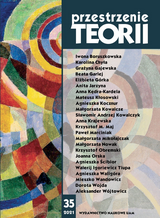Ironia jako dekonstrukcja umierania w Listach Witolda Wirpszy
Irony as Deconstruction of Dying in Witold Wirpsza’s Letters
Author(s): Dorota WojdaSubject(s): Poetry, Polish Literature, Post-War period (1950 - 1989), Theory of Literature
Published by: Uniwersytet Adama Mickiewicza
Keywords: Witold Wirpsza; irony; epistolary poetry; deconstruction; performativity;
Summary/Abstract: This paper focuses on Witold Wirpsza’s Letters from the volume Second Resistance. Poems 1960–1964 (1965) and shows how irony becomes a deconstruction of dying, and at the same time of itself and of literary communication in general. The persiflage-oriented ars moriendi turns out to be a diagnosis directed against the discourses of thanatology, operating in institutions of power, medicine or religion (public letters) and family (private letters). Wirpsza designed it as a play of signs and communication noise in which meanings embedded in surface and deeper semantic levels intersect and contradict each other. This is accomplished by writing about death through epistolary, postal, philatelic tropes, concerning message, mediation and transmission. What are particularly important are the metaliterary parts, parabases intensifying the irony, which contain the vision of a postage stamp robbery as reality transformed into signs. The interpretation of the Letters reveals that the deconstructive irony makes epistolary poetry a literary event – the letter, writing that is to be stolen, killed, read by the reader in her or his own way.
Journal: Przestrzenie Teorii
- Issue Year: 2021
- Issue No: 35
- Page Range: 43-82
- Page Count: 40
- Language: Polish

